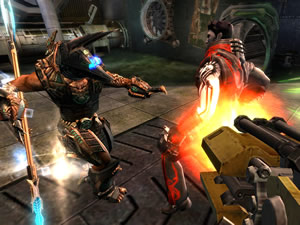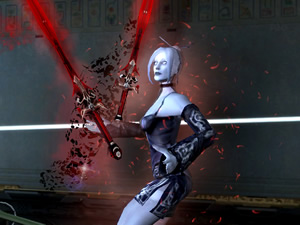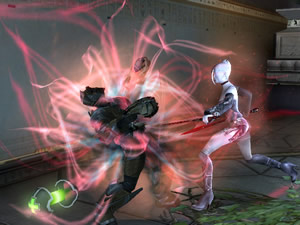Take a stab at it.
On a recent trip to Las Vegas, I got the chance to examine and play most of Midway’s 2005 lineup. Before I arrived at the event, it seemed possible, even likely that I would play them all. I thought perhaps I would painstakingly weigh the virtues of Gauntlet: Seven Sorrows against the admirable qualities and visceral quantities of Mortal Kombat: Shaolin Monks before ultimately deciding to write about John Singleton’s new game starring Snoop Dogg, Fear and Respect.
But for that possibility to become a reality I would have had to play all those games, and I wound up playing none of them, because the first game I examined upon arrival was Unreal Championship 2: The Liandri Conflict, and I only stopped playing when it was time to go. Not because the others weren’t stellar, mind you, they may have been and probably will be. I was just so taken in by The Liandri Conflict‘s combination of classic FPS-action and utterly revolutionary melee combat, that I geeked out and forgot what I was doing.
The first match was a fascinating experience because I was completely and repeatedly destroyed by my opponent. But the difference between us wasn’t that he simply knew where the big guns and power-ups were, nor did it seem to be a matter of reflexes or aim. It was as though we were playing different games, and in retrospect, we were. I was obeying the rules and constraints common to all shooters. He, on the other hand, was leaping through the largely vertical level, pelting me from afar with blaster fire, and dicing me up with a glowing sword whenever I got close.
My opponent could do everything I could and much, much more, and I believe the same can be said of the game itself – The Liandri Conflict is capable of much more than its competition, and represents an important step in the evolution of first-person shooters. The most obvious innovation is the way a single button press can bring you into first-person view mode, or out to 3rd-person melee-combat mode. In the latter, your character will brandish their signature weapon and gain some fascinating abilities.
With a melee weapon equipped you have normal and power attacks at your disposal. The usual relationship between such things holds true: one is quick and light while the other is slow and heavy. What distinguishes melee combat in The Liandri Conflict is the fact that the size and carriage of the characters themselves are also factored in to the impact of such strikes. For example, if a hulking character bashes you with a heavy attack, you will probably shatter.
Smaller characters don’t pack nearly as much punch as hulks, but they do attack at a higher rate. This is important, because if a player is smacked with three consecutive normal strikes, they’ll become temporarily frozen. The attacking player then has the opportunity to execute a sequence of button presses to perform a fatality on their frozen foe. We suspected that acquiring the Unreal license would be great for Midway, but we never anticipated the relationship having such a fascinating effect on the Unreal titles. Apparently, you can even unlock and play as Raiden, which also leads us to wonder what effect this title will have on the Mortal Kombat series as well as the entire fighter genre.
 The Liandri Conflict’s hack’n blast gameplay also extends to mid-air combat with lunging heavy and normal strikes. Both will cause you to streak toward your target, with the heavy attack doing moderate damage and placing you in perfect position for a follow-up standing heavy attack. The normal attack version does less damage, but can also be charged up in mid-air by holding down the normal attack button. When charged for a few seconds, the normal air-strike is lethal. Not only are these attacks absurdly well-balanced, they also provide transportation. All characters are capable of double-jumping and then tacking on an air-strike. If this maneuver sounds a bit too useful, don’t worry, air-strikes cost stamina, which is extremely valuable in The Liandri Conflict.
The Liandri Conflict’s hack’n blast gameplay also extends to mid-air combat with lunging heavy and normal strikes. Both will cause you to streak toward your target, with the heavy attack doing moderate damage and placing you in perfect position for a follow-up standing heavy attack. The normal attack version does less damage, but can also be charged up in mid-air by holding down the normal attack button. When charged for a few seconds, the normal air-strike is lethal. Not only are these attacks absurdly well-balanced, they also provide transportation. All characters are capable of double-jumping and then tacking on an air-strike. If this maneuver sounds a bit too useful, don’t worry, air-strikes cost stamina, which is extremely valuable in The Liandri Conflict.
Melee weapons can also be used to deflect projectiles back at their shooters for double-damage. While this isn’t practical in every case, it works beautifully against the flak cannon, which is one of the most powerful weapons in the game.
The melee weapons are clearly a cool inclusion, but without such incredible game balance they’d be gimmicks. The Liandri Conflict‘s ability to successfully juggle guns, blades, and powers is what truly sets is apart from the rest. This is an ambitious game that shoots for an unreal amount of innovation and somehow works.
The adrenaline powers, for example, are very easy to pull of and wildly useful. With a tap of a button, a translucent menu appears onscreen displaying your powers and the button presses required to activate them. Common powers are super-jumping (quadruple jump plus half gravity) and haste (movement buff), but each character also has some signature powers. One, for example, emits EMP pulses that nullify all incoming explosive rounds. Every power drains stamina which regenerates slowly, and each contains profound implications for melee combat and gunplay.
 The guns aren’t exactly new inclusions, but they still rock. Unreal fans will instantly be familiar with the shock rifle, flack cannon and ripjack. For the uninitiated, every weapon in The Liandri conflict has a regular and alternate fire. The shock rifle, for example, fires a powerful, precise laser beam that is great for long-range headshots and its alt-fire is a slow-moving energy ball that is massively damaging and great for tight quarters combat. If you need to flush out or destroy a hiding opponent, you can fire an energy ball into their vicinity, then blast it with the beam for a wicked explosion, for three guns in one.
The guns aren’t exactly new inclusions, but they still rock. Unreal fans will instantly be familiar with the shock rifle, flack cannon and ripjack. For the uninitiated, every weapon in The Liandri conflict has a regular and alternate fire. The shock rifle, for example, fires a powerful, precise laser beam that is great for long-range headshots and its alt-fire is a slow-moving energy ball that is massively damaging and great for tight quarters combat. If you need to flush out or destroy a hiding opponent, you can fire an energy ball into their vicinity, then blast it with the beam for a wicked explosion, for three guns in one.
Instead of running around and searching for the good guns, you’ll pick your instruments before a battle begins. Every player gets two, one light and one heavy as well as their signature melee weapon.
The Liandri Conflict is a graphically superior game. Running at a steady 60 frames-per-second, it looks gorgeous with incredible textures, brilliant reflection mapping, and sweet explosions.
While we don’t know much about multiplayer game-types (although we know the game will work with System Link for Lan parties) or the single player component, the Unreal series is famous for providing gamers with revolutionary ways to slaughter each other. It’s common knowledge that you don’t bring a knife to a gun fight, but in April 2005 that should change with the release of Unreal Championship 2: The Liandri Conflict.







